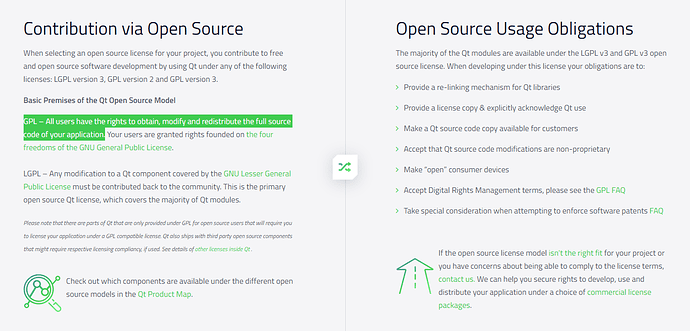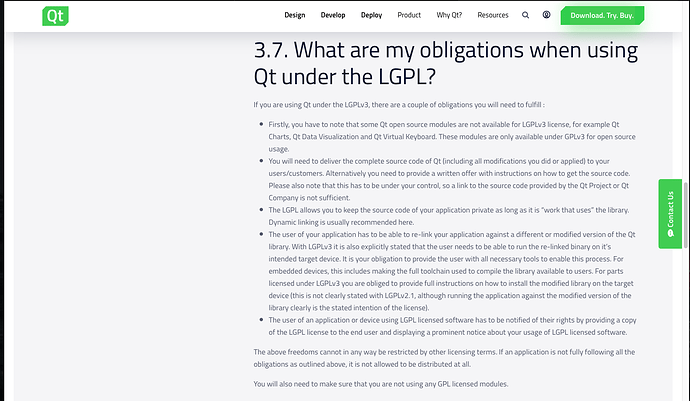Yep, like @anon18404023 says. Shame because it would be a good contender.
If, like Delphi, it relies on MS compiler tool chains then it will always be a Windows only tool.
Plus I think the IDE itself is written in .Net not any of the B4X products
That too may be why there is no IDE on other platforms
Delphi has always been my favorite language/dev environment. But no Mac and REALLY expensive.
Looks good!
How come no one’s mentioned QT yet? I haven’t tried it, but I’ve heard only good things, and it seems pretty well-established.
QT has a great UI, multiplatform, big comunity, etc, etc, etc.
BUT it is not a full RAD, it is just a framework, and a complicated licence model, and it is kind of expensive https://www.qt.io/buy-product/
*To use the free open source licence, your software must be opensourse too.
I have only played with QT, and have not used it in an application because the price is quite high. Yes, there is an open version that I couldn’t get to run. I just checked the website and it is $3,950 for a one-year license. I am sure the program is fine and I know a very few people that use it, and they also cringe at the price.
Here is a Quora answer to “Is Qt dying?”
I am seeing big future in Qt (because of QML), so I don’t think it is dying anytime soon. The reason Qt is not widely accepted is that it is written in C++. C++ is hard to work with for inexperienced developers who are the majority and they use Java, Python, HTML5, etc… C++ bugs are very hard to find if you don’t know what stack is, if you don’t know how to debug, if you never heard about valgrind, if you write “dirty” code. This is why Qt isn’t popular among them. But Qt is extremely powerful framework and it is the most portable. You can write an app and run it on any desktop , any mobile platform. The most promising technology in Qt released recently is Qt Quick. With QML you can write applications like in HTML5 but extend it with C++ objects anytime easily. This gives you great amount of power if you want to design code for performance (like in games for example) or for size while removing the danger of direct C++ code. So, don’t expect Qt will be popular among the crowd, it wont, crowd are not the professionals and therefore they don’t lead the industry. Qt is used to deliver fast and efficient code, it is used by large companies to bring high quality apps to the user, and those (companies) are the minority, but they produce usually the most wanted apps. Think of Qt as a framework for killer apps, that’s why you have this perception that Qt is dying. It is not dying, it is just you (as a user) don’t see what is happening behind the scenes. Software for a minority where there is little competition from other market participants is easily done with Java (and other frameworks), but if you are competing for a large user base, your choice is C++ only. If you don’t pick C++ it’s like giving a gift to your competitor. Obviously large companies like Microsoft or Adobe can pay the development of their own GUIs, but if you are a small software development firm with desires to provide a wide-spread high performance App, then Qt is the best option. And many companies do this by paying their commercial licenses and you never know what did they use unless you disassemble some of their binaries.
Thanks Eugene and Ivan for the enlightenment!
That is not true. You can absolutely use the free, open source LGPL-licensed version of Qt for closed-source commercial applications. I’d wager the majority of Qt applications are done precisely that way.
I’ve used Qt/QML quite extensively the last three years. QML is a really nice framework for creating applications and the Qt framework provides a vast amount of features/functionality.
However, some downsides include:
-
The UI is entirely custom drawn, there are no native controls.
-
Packaging/building is not as easy as with Xojo, and occasionally requires futzing with arcane configuration files and occasionally adding/editing a line or two in a C++ file.
-
If you chafe at using the LGPL version and want some of the advantages of using their commercial version, it gets really expensive (not all that expensive for a medium-to-large business, but very expensive for a hobbyist/small-time business programmer).
-
QML is a declarative language with JavaScript-like syntax, and code is implemented in actual JavaScript, so if you don’t like that, you won’t enjoy using QML; if you don’t enjoy using QML, the alternative is C++, but that’s a completely different framework and set of widgets than the QML widgets, so you kind of have to choose one or the other and stick with it.
-
The C++ widgets are somewhat dated and aren’t getting as much love from Qt developers as the newer QML stuff.
-
The community is much larger than Xojo, but smaller than just about any other competitor you can think of. There are no recent books to help you, very few tutorials or other articles on the web, less help on StackOverflow than you’d like, etc.
-
Qt/QML is near useless for mobile development. There’s a third-party framework (Felgo) that makes it viable, but it’s expensive itself.
I really do enjoy QML, however, and it can produce some very slick applications, so I say it’s definitely worth exploring.
This hast made much progress then ?
Nope. That research project never went anywhere. Qt’s C++ widgets are and always have been styled very closely to native controls, so much so that many users probably wouldn’t notice a difference, but they’re definitely not native. QML widgets have optional styling that sorta looks like native styling, but the default is a non-platform-specific material design style, and they’re really not even trying to emulate native controls.
Sure, if you violate the licence agreemt you can do whatever. But what about the posible legal consequences?
Thanks for the info
It is not a violation of the license agreement. You are allowed to release a closed-source commercial application using Qt under its free open source LGPL license. Qt encourages it, documents it, and fully supports it. The page you screenshotted says that.
LGPL obligations clearly stated on the FAQ page https://www.qt.io/faq/
It seems there are bits that are either GPL or commercial and not LGPL
Maybe my english is worst than i thought but, reading the page I screenshoted, the licencing page, and the faq:
- Use open source GPL license if your app is open source/personal/internal/academic
- Use open source LGPL with your closed code IF you meet all the obligations @npalardy posted
- Use commercial license for commercial applications
The only obligations under LGPL are to follow normal LGPL requirements and don’t use one of the small number of non-LGPL modules. Commercial vs non-commercial is not a distinction that matters. You can sell a closed-source application under LGPL.
Right I was just meaning that there are some item from Qt that you cant use in LGPL as they are strictly GPL OR Commercial only - they list a few

